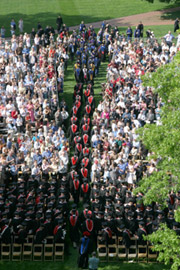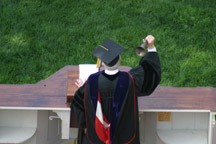 | |
|
2004 graduates march out
|
I’ve seen a lot of Wabash Commencement exercises in my 17 years working here—not to mention my own graduation in 1987. There’s a good feeling of familiarity, of tradition associated with the ceremony. Thanks to the efforts of so many people at the College, the event comes off like clockwork. Sometimes we even think of it as routine, though to every graduating class it is a unique and memorable day.
This year, however, seems different to me. And I can’t quite put my finger on it. The way the year ended—with Tony Lobdell drowning in a mountain lake in Argentina—certainly gives the community pause, but that’s not the only reason.
Perhaps it’s the month’s news headlines. For the last several weeks we’ve heard about the interrogation of Iraqi prisoners, which reached beyond the limits of ethical treatment. In "retaliation" we see an American civilian beheaded, live and on the web for all the world to see. We’ve seen the blood and sweat-stained uniforms of American military in every newspaper and every news broadcast of every single day.
We see our most trusted politicians testifying daily before Congressional committees. We’re bombarded by eight-second sound bites from the Left and the Right as the battle for the White House and control of Congress reaches a fever pitch.
It’s a strange and difficult world our 180 new graduates enter today. How comforting their four years on the Wabash campus and in this community will seem in just a matter of weeks when they are forced to engage more deeply as citizens of the world.
 | |
|
President Ford rings out the class
|
These men of the Class of 2004 have spent four years pursuing the Wabash mission to "think critically, act responsibly, lead effectively, and live humanely." When the late poet Don Baker crafted the framework of that mission statement, he ended it with "…in a difficult world."
Never before does the phrase "…in a difficult world" appear to be more accurate.
These men of the Class of 2004 argued and debated the world’s greatest questions. They have looked through microscopes at the building blocks of life. They have learned languages other than their own, and have practiced those languages in countries around the world.
They have spent summers as interns in high-rise business offices and in cool, antiseptic laboratories.
They have read the words of Shakespeare, Hemingway, and Wordsworth. They have studied the work of Plato and Socrates. They have carefully read and put into context the Declaration of Independence. They have learned from history of the great leaders, the great sacrifices, the successes, and failures.
The men of 2004 have discussed the rise of the Roman Empire and know why it fell. They have learned from active participants of the movement for Civil Rights in this country; they have read Martin Luther King, Jr. and Malcolm X.
Indeed, the men of the Class of 2004 have learned to "think critically, act responsibly, and lead effectively."
My hope for our collective future is that they—and 2004 graduates everywhere—have learned, or soon will, to "live humanely in a difficult world."
What we’ve seen, heard, watched, and witnessed in the months of April and May have led me to doubt technology and question authority. At the same time, those events have reinforced in my mind the need for civil discourse, for humane action, and for a deeper understanding of others.
May God—Allah—be with the Wabash graduates as they embark of their life’s journey, and with the thousands of graduates nationwide who hold in their hands our hopes for a better tomorrow.